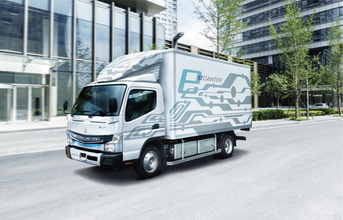
Daimler India Commercial Vehicles (DICV), the wholly-owned subsidiary of Daimler Truck AG (Daimler Truck) announced its foray into the Indian battery electric market with the all-electric, Next-Generation eCanter. The market launch of the all-electric eCanter in India demonstrates the company's larger vision to decarbonise its entire product portfolio in the long term. The all-electric eCanter, which marks DICV's foray into India's light-duty truck segment, will be launched in the market within the next 6 to 12 months.
From a global perspective, Daimler Truck is fully committed to the Paris Climate Protection Agreement. With a clear vision to decarbonise the transportation industry and reduce resource consumption, Daimler Truck is striving for its new trucks and buses to be CO2-neutral in Europe, Japan and USA by 2039, and globally by 2050. DICV is working on the readiness of a CO2-neutral product portfolio in line with Daimler Truck's global decarbonisation vision and the overall target for India as soon as possible following the core markets.
Satyakam Arya, Managing Director & CEO, Daimler India Commercial Vehicles said, "All our efforts are being put into achieving robust readiness for our future products that will feature CO2-neutral propulsion technologies in the long term. The launch of the all-electric eCanter in India, within the next 6 to 12 months, is the first step in our long-term strategy to decarbonise our entire product portfolio. However, the reality is that diesel ICE and CO2-neutral propulsion technologies will continue to co-exist in the Indian market for the foreseeable future. A long-term plan like ours hinges on many complex external factors, some of which are, the availability of a charging and refuelling infrastructure, the availability of green energy, cost parity and wide-scale customer acceptance. Therefore, our initial focus with the eCanter is to achieve product and service excellence, along with customer acceptance. Over the next two decades we will have a firm footing with decarbonised transportation solutions and will be making progress towards becoming a leader in sustainable transportation in India."
DICV has a keen eye on the how the Indian market shapes up over the years. The company's CO2-neutral propulsion technology roadmap is being prepared in line with Daimler Truck's global technology strategy with battery electric and hydrogen-based drive technologies. DICV has already developed a BharatBenz hydrogen fuel cell concept coach in alliance with a large Indian conglomerate. In the future, DICV will introduce trucks across different utility segments that will serve long haul, mining, construction, POL, dumper, RMC and so forth for various freight and terrain requirements.
"LNG, if used at all, will be an interim, tactical solution for long haul transportation. We will primarily commit to battery-electric and hydrogen-based propulsion technologies across our future product portfolio, in a phased manner. One thing is for sure that we will be ready with the right vehicles when the market is," said Arya.
The all-electric eCanter for India is undergoing advanced trials. The battery electric platform originated in Japan where the series production of the first-generation eCanter started in 2017. The all-new, Next-Generation eCanter had its world premiere in Japan and Europe in the second half of 2022. Since the launch of the first-generation in 2017, the eCanter has sold in hundreds in Europe, Australia, New Zealand and Hong Kong. The proven, next generation of the eCanter will have significant presence in major markets around the world with a 100 variants.
India's CO2-neutral propulsion technology market is still in its infancy and therefore has tremendous scope in the long term. India is also a world-renowned base for R&D and will continue to grow as the hub for product development in the future, as new technologies get introduced. However, India needs conducive, robust policies and a market environment to compete with the world going forward.
Commenting on how a conducive policy framework is crucial to ensuring economic viability for customers, Arya added, "Successful adoption of CO2-neutral vehicles is possible if there is wide consumer acceptance about changes in the equations of total cost of ownership. This underscores the influence of important factors in achieving success in sustainable mobility solutions. By foraying into the CO2-neutral propulsion technologies, DICV aims at contributing to India's future as it progresses towards becoming one of world's top five commercial vehicle markets."



























